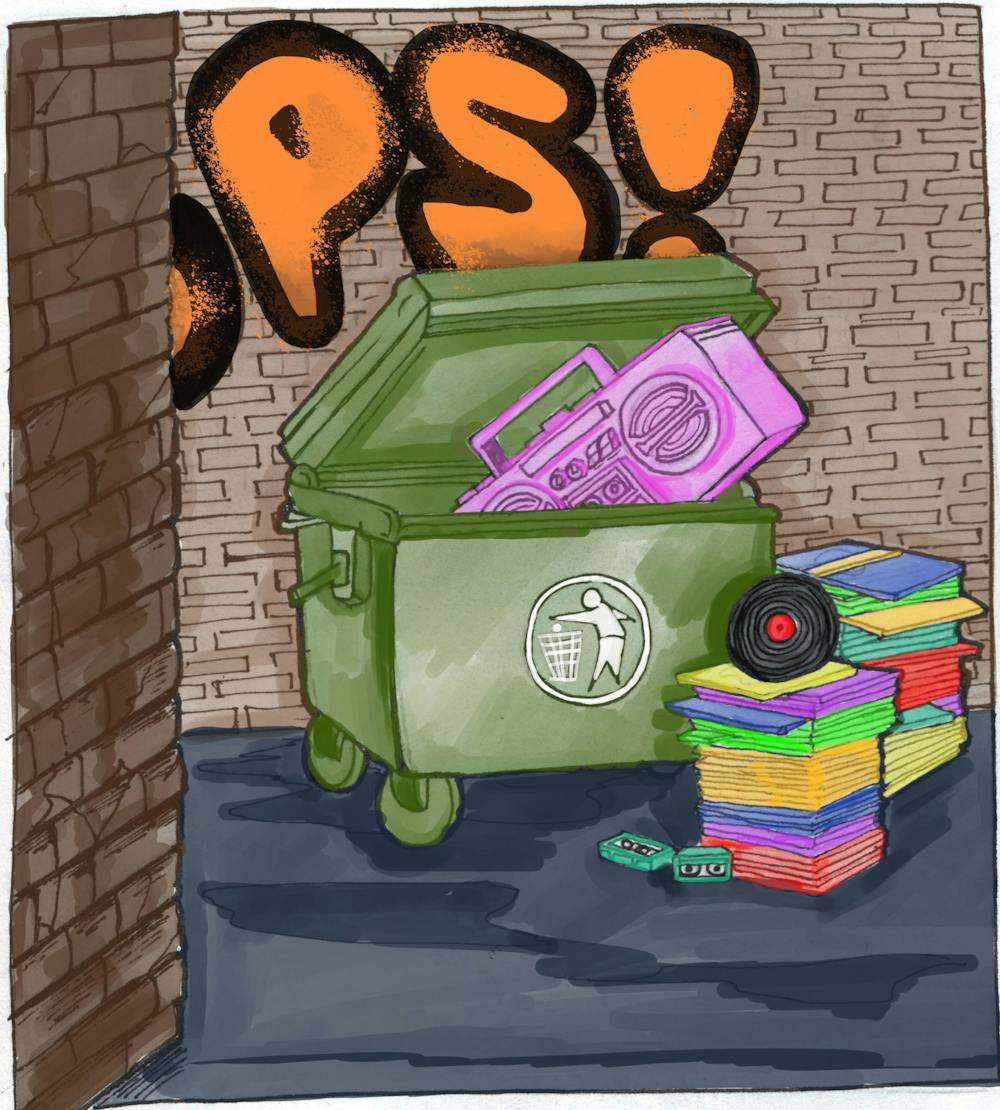It’s 2 a.m on a Saturday, and I am once again attempting to organize my Spotify library. So far, I’ve succeeded in making a measly morning playlist and finishing my 20th listen of “9 to 5” by Dolly Parton. Glancing at the time on my phone, I sigh and shut my laptop screen to get ready for bed, knowing full well that I will not be continuing my efforts tomorrow.
I go through this routine every month. Part of the reason I’ve never been good at maintaining an organized collection of music is that my music tastes change so frequently. One day, I’m obsessed with an artist; within a year, not a trace of them will be left in my library. Usually, this process is gradual, but there have been times where I’ve dropped an artist all at once. Whenever I get a new music streaming app, I usually make an effort to not add artists I’m no longer interested in. Sometimes, when I set up my account, I’ll forget that a band even exists. I take that as a sign that they’re probably not worth incorporating back into my playlists.
I’ve always wondered if other people went through the same motions. Do people make a conscious effort to stop listening to musical artists? If so, why? Over the past few weeks, I asked students from three different universities about their experiences with music and dropping artists.
Rachel - University of Wisconsin-Madison
The first person I spoke with was my close friend, Rachel. She and I had already talked briefly about the topic, so when I asked her if she’d stopped listening to anyone in the past year, I wasn’t surprised when she mentioned Panic! at the Disco.
“Panic! used to be my favorite band, and I still listen to their old music, but for multiple reasons, ever since the band only had Brendon Urie as an original member, I’ve stopped listening. He has a lot of issues with being problematic, and there’s just been a general decline in quality,” Rachel told me.
Brendon Urie is the lead vocalist of Panic! at the Disco. According to viral content site Distractify, he’s been allegedly involved in several controversies for his comments on race and the LGBTQ+ community. He has also been accused of sexually assaulting an underage fan.
Besides Urie’s conduct, Rachel also cited a change in sound as a reason why she decided to skip over the band’s new releases. She was disappointed that they were moving away from their pop punk roots, blaming this on lead guitarist Ryan Ross and bassist Dallon Weekes’ departures from the band.
“Now their stuff sounds so ‘radio-worthy.’ There’s nothing inherently wrong with current pop music, but it feels more like a cash grab than making music to make music,” said Rachel. “I’ve said it before and I’ll say it again — if you look at their top five songs on Spotify, it’ll tell you almost everything you need to know.”
Lyla - Northwestern University
One of my high school friends, Lyla, expressed an opposing viewpoint. While many fans are invested in the daily lives of their favorite performers, she refrains from getting attached to musical artists as people, basing her enjoyment entirely on the music itself. Consequently, while these fans, including Rachel, may stop listening to an artist because they disagree with their behavior, Lyla actively avoids delving into an artist’s personal life, rarely reading about them or watching their interviews unless they are already deceased.
“I do this because basically everyone has done or said something bad at some point in their career. I listen to some artists who are very obviously problematic, but I won't make it my duty to defend them because I refuse to have a personal connection with them beyond the art. The only time when the artist's behavior stops me from listening to their music is when their problematic behavior or ideology makes some kind of appearance in their art,” she said.

When I asked Lyla to name a musical artist she has stopped listening to, she responded that she recently turned her back on Nirvana. In line with her philosophy about music, she simply stated that “their music is a bit too conventional for [her],” and that she now craves sounds that are “more out-there.”
Austen - Princeton University
Unlike the other people I interviewed, Austen was the only person I had never talked to at length about music. His taste is pretty eclectic. Originally a pop rock fan, he’s recently gotten into country, K-pop, and classical music. Interestingly, this trek through different musical genres is the reason he stopped listening to Sugar Ray and Coldplay. I don’t have a strong opinion on either band, but I’m sure many music snobs are elated.
Other than moving on to new genres, Austen says he “personally [has] never stopped listening to music due to issues surrounding artists themselves.” He also thinks that “for the most part, the work can be separated from the creator,” and that people shouldn’t feel guilty for appreciating good music, even if the artist is problematic.
However, like Lyla, he draws the line when an artist’s bad behavior starts spilling into their music, listing R. Kelly as an example.
“I tend to avoid sexual songs by R. Kelly, or at the very least, I make an effort to think about them in the context of his personal history,” he said. “However, I consider other songs of his, like ‘I Believe I Can Fly,’ to be generally inspirational and separate from his despicable actions, so I have no qualms listening to such music.”
I found it interesting to observe the nuances in people’s opinions, especially as they relate to specific artists. While it seemed like all three students had pretty crystallized positions, they made exceptions for certain songs or certain histories, demonstrating that the decision to stop supporting an artist is often a personal one.
Savannah - Northwestern University
Up until this point, the responses I received from the people I interviewed suggest that it’s the artist — whether it’s their behavior or the quality of their music — that causes people to stop listening to them. However, changes on the listener’s end can also lead to a shift in taste.
The last person I talked to was my friend Savannah, who had decided to stop listening to Rex Orange County, a favorite among our high school friend group. She didn’t stop listening to an artist because of a cancel-worthy scandal or a decline in quality. Instead, the feelings that had initially connected her to Rex Orange Country’s music simply faded.
“I listened to his recent album, ‘Pony,’ when I was going through it after losing a friend, and it comforted me because a lot of it was about change and learning to like yourself,” she said. “It was very vulnerable and reminded me that I wasn’t alone in my feelings. It really is an album to cry to but feel some hope afterwards. I stopped listening to it because I found other ways to cope and moved on from that headspace. I still revisit songs from it every once in a while, but it’s not something I rely on anymore.”
After discussing the album with Savannah, I decided to come back to some of Rex Orange County’s older music. I hadn’t actively listened to him since graduating high school and found myself relating to a lot of what Savannah had shared. When I listen to songs like “Television / So Far So Good” and “Untitled,” I squirm. Not because they’re bad songs, but because they remind me of a version of myself I no longer identify with.
I’m not a very sentimental person, and I generally believe in the value of moving on from things. Regardless of one’s reasons, I think being able to let go and revisit artists is part of the joy of listening to music. I’ve given up on organizing my Spotify. From now on, I’ll let my library of music grow wildly, weeding and planting as I please.









